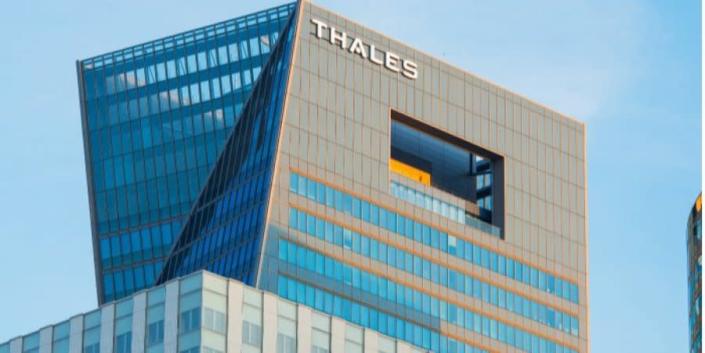
Thales’s communication team is responding along two lines. First, they set up S3NS – a new enterprise, partnering with Google – to provide the French government with cloud computing services and sensitive data storage. The second one relates to a new line of UAVs, which will be used to monitor certain security issues.
This sequence of press releases aims to counter the negative PR fallout from two scandals, which have been rather damaging to the image of the company and France itself. After all, the French government remains Thales’ largest shareholder (25.67%). Another 24.62% belongs to Dassault Aviation, which is affiliated not only with the Dassault family (we’ll talk about them later), but also with Airbus S.E. Airbus is lobbying hard against any further Russian sanctions. The Dassault connection is rather plain: Dassault Aviation manufactured French war planes for decades, and was founded by Marcel Dassault, who was a two-term French Senator, with direct influence over state defense policy. It’s little wonder then that any negative PR reflects poorly on the old European elites, making them rather uncomfortable at very time they have been caught getting fat on Putin’s blood money.
Thales is a huge, diversified enterprise with a dozen subsidiaries. We will focus only on a selection of those: Thales E-Security, Sofradir, and Lynred.
Scandal the first – a military one
After Russian troops withdrew from Bucha, near Kyiv, in March 2022, it has emerged their tanks were equipped with Catherine thermal visors – one of Thales’ flagship products. According to the company’s website, these devices make it possible to engage the enemy at greater ranges, providing “a first strike” advantage.
Ukrainian volunteer Pavlo Kashchuk discovered a modern Thales visor, installed on a Russian APC, abandoned near Kyiv. The vehicle in question was upgraded in 2016 – well after 2014 EU sanctions on Russia, which banned dual-use technology exports to Moscow.
“The most interesting bit is the fire control system, which allows for accurate fire under any weather conditions and at any time of day,” said Kashchuk.
“The components and technology for this system had been transferred to russia by the French company Thales. The Catherine FC – a thoroughly non-Russian (product) name – thermal visor allows the enemy to spot their victim from several kilometers away. It is allegedly assembled at a Russian factory in Vologda, under a (French) license – following French blueprints and using French components. It’s but one of the schemes under which Western companies can circumvent existing embargoes and supply russia with cutting-edge military technologies. Naturally, their governments are complicit by turning a blind eye to this.”
Kashchuk’s YouTube channel has another video, where a modern russian thermal visor, manufactured sometime after 2019, is shown to contain components made by other French companies (Ulis and Safran). As it turns out, Thales’ subsidiary, Sofradir merged with Ulis in 2019, establishing Lynred. Lynred, in turn, is owned by Thales (50%) and Safran (50%).
Once all this became public, French and international investigators started looking into Thales.
Disclose – a non-profit investigative journalism organization – discovered that France issued 76 export licenses for military- and dual-use goods since 2015. These include thermal visors and avionics, worth EUR 152 million ($158 million). This figure was corroborated by Investigate Europe, and puts France in an awkward position of being responsible for 44% of European weapon exports to russia – the very same weapons that are now used against Ukraine. According to Disclose, France has supplied thermal visors for over 1,000 Russian tanks, on top of navigation systems and infrared sensors for russian fighter jets and helicopters.
As for Sifradir, it has been established that while it still was a subsidiary of Thales, it supplied russian companies Linkos and GIPO with 83 S24 infrared sensors, 258 S02 infrared detectors, and 138 S10 infrared sensor, in 2016 alone. GIPO is the Russian state-owned Institute of Applied Optics, which was
Prior to February 2022, none of this really mattered; these were simply the efforts by the French government and elite to skirt around sanctions to earn some cash. Not to mention, the French are almost clear of any wrongdoing, legally. While the Council Regulation (EU) No. 833/2014 forbids dual-use exports to Russia, it provides for national governments granting export licenses to fulfill existing contract obligations. To make use of this loophole, Thales kept extending its old contracts with Russia, which made it possible to keep the shipments going.
We’re certain this is but the tip of the iceberg when it comes to military ties between France and Russia. But this is already enough to explain why French President Emmanuel Macron kept calling Russian dictator Vladimir Putin, and implored everyone else to help Putin “save face.” Turns out, it would have allowed France – or at least its defense sector – to save face, too.
And while perhaps we could go easy on France, as it provides Ukraine with heavy weapons, we can’t Thales get off lightly. Polish EMPs were once again at the forefront, when they started asking in March why French companies are breaking with EU sanctions so brazenly.
Scandal the second – a banking one
Oleksandr Dubilet,
Chairman of the Board of Privatbank (1997-2016), banking and finance expert
Last week, Thales finally announced it was cutting ties with russia. This was made possible by the combined efforts of Ukrainian volunteers and Ukraine’s Foreign Ministry. Volunteers gathered the necessary evidence, while our diplomats brought the issue to international attention.
It’s worth noting that the announcement came on the day Macron visited Kyiv, where he pledged France’s unequivocal support of Ukraine.
But Thales, being as they are, still found a way to mess it all up.
A recently leaked internal report by the russian Alfa-Bank stated that the russian banking sector is hurtling towards a disaster, after Thales E-Security closed its Russia operations. Turns out, the security of credit cards, belonging to 100 million customers could be in jeopardy.
An investigation by Le Parisien similarly claimed that russian banks worry about Thales leaving the market: Thales solutions PayShield 9000 and PayShield 10K HSM are apparently critical to securing transactions via cards issued by Alfa-Bank, Sberbank, and VTB.
The announcement ended up being nothing but hot air. Thales quickly reassured its russian customers that their banking security products will continue operating normally. Leaving russia, it seems, is not going to happen after all.
This is the exact message that was passed to Russian banks: “Political manipulations cannot and should not affect the level, quality, stability, and effectiveness of our products and services, including on the Russian market. We will continue to ensure full operational capacity of our hardware products.” Cutting ties somehow transformed into “political manipulations.”
Ukrainian blogger and activist Anton Shvets summed it all up this way:
“If Thales instantly turned everything off, Russian banking would have collapsed. Russian banks operating normally indicates that (Thales) Group continues working for them. 80% of Russian banks use their services, and 100% – in occupied Ukrainian territories.”
What’s next? Plenty of evidence has emerged since Feb. 24, suggesting that European sanctions against Russia aren’t effective. Without tangible enforcement, they are entirely symbolic. Experts agree that in order to isolate Russia and curtail its economic ties with the rest of the world, sanctions breaches should be publicized, and responsible parties held legally accountable. First of all, evidence of companies skirting sanctions must be gathered. With Thales, it all began when photos of the captured russian APC began circulating on social media. Once public, this information allowed lawyers to start thoroughly investigating the company. It’s also crucial to pass all the findings to relevant EU bureaucratic bodies and law enforcement. Depending on jurisdiction, breaching sanctions could even be considered a criminal offense.
Ukraine currently enjoys unprecedented global support in its defense against the russian invasion. Our lawyers, together with various state agencies, have a unique chance to finally bring to justice all those who dare to ignore European sanctions, and isolate the aggressor.




